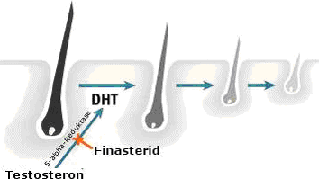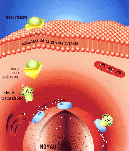| |
Dihydrotestosterone (DHT)
What male pattern baldness sufferers inherit are hair follicles with a genetic sensitivity to dihydrotestosterone (DHT). Hair follicles sensitive to DHT begin to miniaturize, shortening the lifespan of each hair follicle affected. Eventually, these affected follicles stop producing cosmetically acceptable hair. Testosterone converts to DHT with the aid of the enzyme 5-alpha-reductase.

5-alpha reductase was found in human scalp hair follicles and elsewhere in the skin, where it carries out the same reaction as in the prostate. It is thought that disturbances in 5-alpha reductase activity in skin cells might contribute to male pattern baldness, acne, or hirsutism.
There are two types of 5 alpha reductase enzyme each coded by a separate gene and each produced by different tissues, the genes for 5-alpha reductase has been mapped to chromosome 5. Although both may be important in pattern baldness development, type I 5 alpha reductase may be more important because it is highly active in scalp skin and hair follicle sebaceous glands. It produces 60% to 70% of the total DHT in our bodies. Type II produces the remaining 30% to 40% of DHT.
It has been observed that levels of type II 5 alpha reductase in the outer root sheath of scalp hair follicles is less as compared to Type I so it is believed that local activity of both type I and type II 5 alpha reductase which contributes to androgenetic alopecia development.
A Hair Growth Formula for DHT
Many companies every now and then churn out new natural hair growth formulas by combining GLA, ALA, Linoleic Acid, Azelaic acid, Vitamin B6, Zinc Sulfate and Saw Palmetto extracts. These ingredients work through different mechanisms to synergistically inhibit both type 1 and 2 forms of 5-Alpha Reductase and decrease DHT locally. By decreasing the DHT levels, hair follicles can grow and thicken naturally, leading to a fuller, healthier scalp without the side effects associated with synthetic medications.
Sebum
Sebum can propagate bacteria and parasites, which lead to inflammation. This will lead to continue hair reduction over time. Hair will gradually become thinner and thinner every time when repeating the growth cycle, and eventually, the hair will become weak villi.
Circulatory system
Normal blood circulatory system is responsible for transporting nutrients to the hair; however, situations like microvascular injury, abnormal living habits (e.g. excessive alcohol and tobacco, not enough sleep, etc.) would worsen blood circulation and metabolism.
In addition, often wearing hats or wearing the wig, hot and sweating skull, scalp vascular may oppress which block the blood flow and circulation. This will lead to shortage of nutrient supply to the hair and will lead to impede the normal hair growth, resulting in hair loss.
Disease/Illness
Serious injuries, surgery or serious illness, will lead to hair loss and this may happen after more than three months of the incident. Patients will begin to alopecia. After another three months, hair should recover and things will get better.
If it is a serious and long-term disease, such as heart disease or diabetes, hair loss may persist.
Stress
Stress and depression will lead to hair loss, because patients with anorexia often may result of malnutrition, hormonal disorders, or even brutally combing their hair. In addition, the emotional tension, anxiety, the continuous pressure will tighten the nutrition supply to blood vascular to the hair root. Stress reduction or relaxation can be helpful in slowing hair loss. Head massage would also help to relieve pressure, and improve blood circulation on the scalp.
Type of Baldness

Holding down the guiding pins on your scalp and start combing the thinning spots. Comb the hair very slowly.
Lightly press the Hair Follicle Stimulator at a spot on the
scalp for several times, repeat process on different area
for approximately 15-20 minutes.
|

Click on graph
to enlarge |

